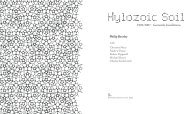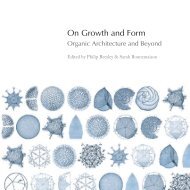The Inner Studio - Riverside Architectural Press
The Inner Studio - Riverside Architectural Press
The Inner Studio - Riverside Architectural Press
Create successful ePaper yourself
Turn your PDF publications into a flip-book with our unique Google optimized e-Paper software.
THE INNER STUDIO<br />
Psychologically, the shadow is a positive or negative aspect of the<br />
self that is unconscious and, therefore, is not under the control of<br />
the ego. Given its elusive character and its profound capacity to<br />
generate trouble, the shadow requires particularly careful reading.<br />
This chapter sketches out the way our psychological shadow affects<br />
the built world through its impact on the designer and how designers<br />
can learn to bring their own shadow into the act of designing.<br />
<strong>The</strong> shadow is deceptive; it is a master of disguise. Because it is<br />
unacknowledged, it always seems to belong to others. We see it<br />
everywhere, but can never find it because it actually belongs to our<br />
own unconscious. <strong>The</strong> way we become aware of our shadow is<br />
through a mechanism Jung called projection, an involuntary<br />
psychic act whereby we cast our shadow onto others. This act is<br />
always charged with energy and it is this energy we have the opportunity<br />
to reclaim for our own lives through the therapeutic process<br />
of “owning” the shadow. <strong>The</strong> direct way to discover our own<br />
shadow is to notice what we find most annoying in others. Chances<br />
are that the traits you find most irritating or overwhelming in<br />
others point to your own shadow aspects. Keep in mind that our<br />
projections usually involve judgments that have us see ourselves as<br />
greater than others (inflation) or worse than others (deflation).<br />
Neither position is actually true.<br />
When we see others who appear successful or creative we may<br />
be swept away by their opinions and forget our own talents because<br />
we may have grown up never hearing that we were creative or<br />
could be successful. By owning this example of positive projection<br />
we can allow ourselves to connect with our repressed creativity and<br />
begin to become more confident about our own abilities. Another<br />
example might find us being judgmental whenever someone<br />
around us becomes angry because we may have grown up in a<br />
home where anger was forbidden and repressed our own anger.<br />
Instead of then judging others, we need to get in touch with our<br />
own repressed anger so that we can use its energy at appropriate<br />
times and in appropriate ways.<br />
Jung stated that we unconsciously project to the extent that we<br />
have not consciously assimilated the shadow’s presence. Inevitably,<br />
therefore, what we like least in ourselves we will unconsciously<br />
94





